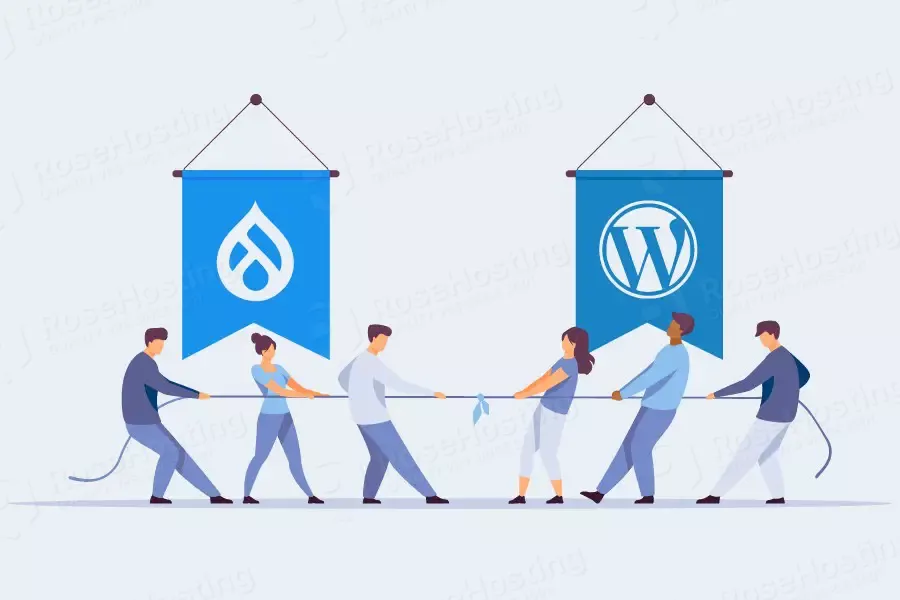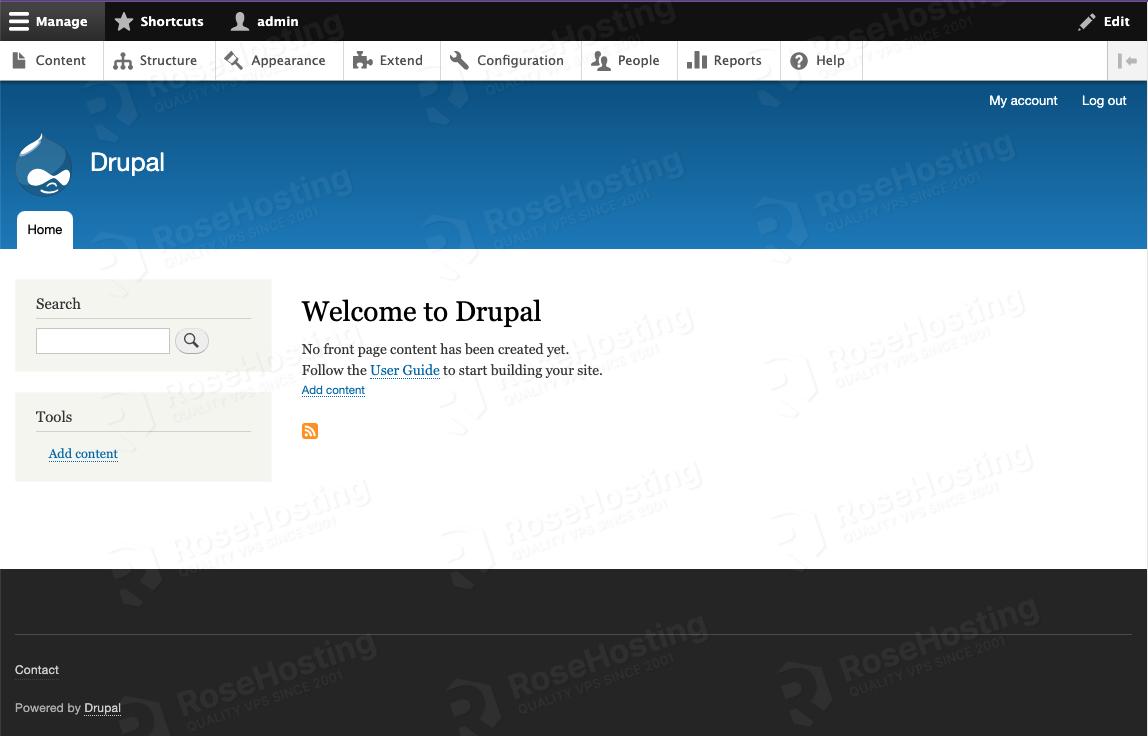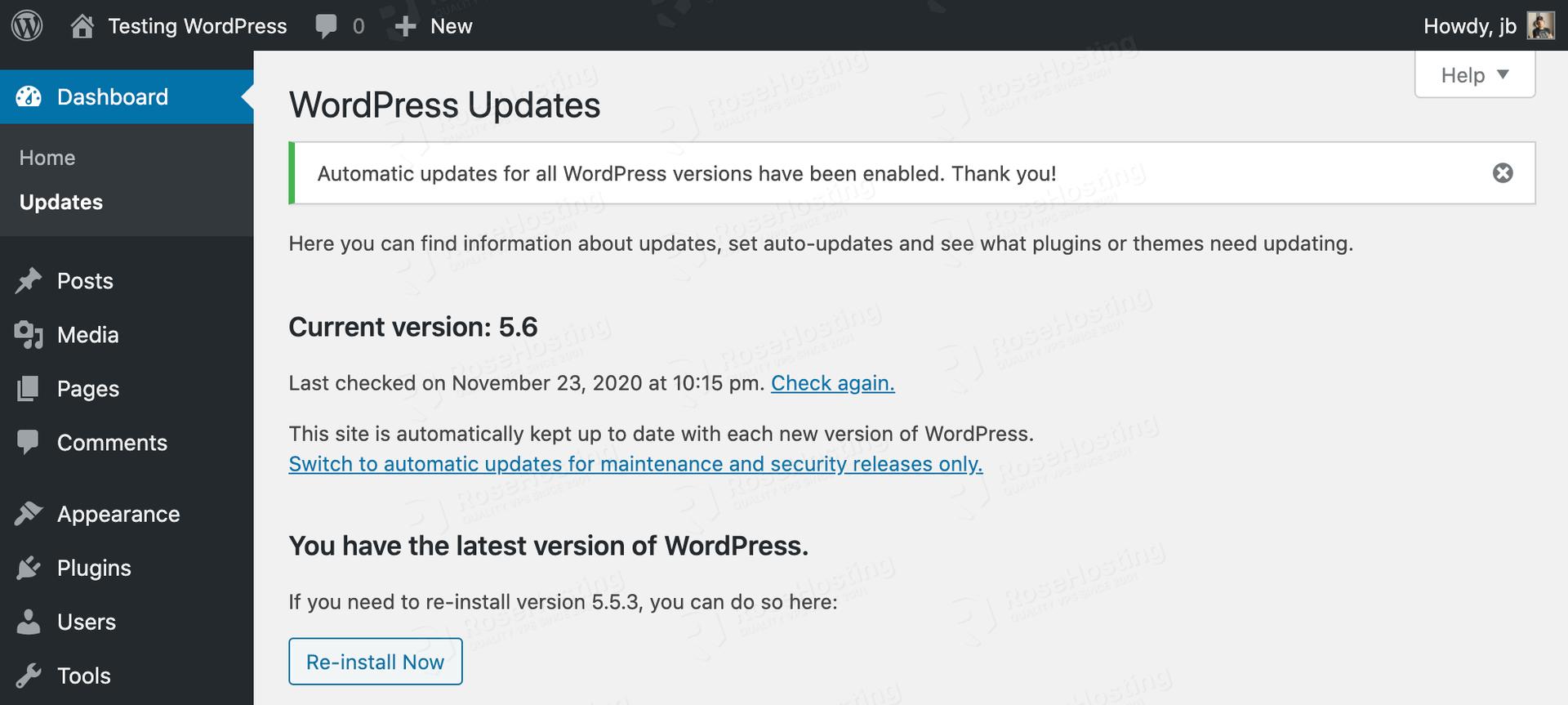
Think of a content management system (CMS) as an engine that brings your website to life. It allows you to build and publish your content without having to code it all from the ground up. In fact, certain content management systems won’t require any coding knowledge, such as HTML and CSS.
Drupal and WordPress are two of the most popular content management systems on the market. Each can help you create engaging content, customize your site’s look and feel, and in turn, help you grow your audience.
Simply put, the main difference between WordPress and Drupal is that Drupal has more customization features, while WordPress is much easier to use. As two of the most popular CMS platforms, the Drupal vs WordPress comparison is an ongoing debate.
So, which CMS is the best choice for you?
Table of Contents
What is Drupal?

Drupal is an open-source content management system that powers millions of websites worldwide. Open source means that you can modify the Drupal platform without any limitations, and it is entirely free if you plan to do the legwork yourself. There are paid premium options of support, which sustain the continued development of open-source platforms such as this.
There are thousands of modules and plugins available that can help you customize your Drupal website. Additionally, a core team of Drupal developers contributes continuously to enhanced features and performance.
To start with this CMS, you’ll first have to choose an appropriate Drupal hosting plan. Once you have your server, your files, databases and other instances can be easily transferred through a Drupal migration process in no time. If you get a fully-managed hosting provider, they will take care of the entire migration process for you.
To give you an idea of just how powerful this CMS is, here are several examples of popular Drupal websites:
What is Drupal Used For?
Many popular corporations, media groups, universities, governments, and large financial companies use Drupal. To start with Drupal, web development and theming must be backed by a content strategy. This CMS is a great option if you are looking to build complex and custom websites and even works well for simple websites with in-built future-proof scalability.
Drupal is, therefore, best suited for the following:
- Large sites with intricate needs
- Websites with strict security requirements
- Web applications with complex integrations
- Sites with advanced customization requirements
- Sites with large amounts of content
- Global enterprise-level sites with dynamic content organization
- Global-centric sites with out-of-the-box multilingual support
- Financial companies, governments, corporations, and universities
What is WordPress?

WordPress is currently the most popular CMS that makes it easy to create and manage a website. It powers more than one in four sites on the web. Bear in mind, however, that there is a big difference between WordPress.org and WordPress.com.
Self-hosted WordPress.org is the source where users can download the software to build and own their websites with their hosting provider of choice. This is our suggested choice as you easily get to move your site as and when you see fit.
WordPress.com, on the other hand, is a service that helps users to build a website using WordPress software with their own paid managed platform.
Here are some popular WordPress sites:
What is WordPress Used For?
WordPress is mostly used by small business owners, bloggers, or e-commerce businesses to create relatively easy-to-build and manage websites, online stores and blogs. Thanks to WordPress’s massive amount of themes and plugins, this CMS can be used for virtually any type of website.
For instance, WordPress powers a huge number of business sites and blogs, but it’s also the most popular way to create an eCommerce store.
WordPress is best for:
- Small-to-medium business websites
- Bloggers and e-commerce stores
- Personal websites with preferably static content
- Leading news organizations
- Portfolios and resumes
- Startups with no customization requirements
- Forums and social networks
- Membership sites
Main Differences Between Drupal and WordPress
One of the reasons why WordPress continues to have the biggest part of the market share is that it is much easier to use than Drupal. However, WordPress is well known for being less transparent about security issues than Drupal. Since WordPress is grabbing more of the market share, it is also a lot more susceptible to attacks.
Now that you have a brief insight into these popular CMS platforms, here are the main differences:
- Drupal powers 1.2% of all websites across the globe and is best for developers, government and education institutions or serious business owners opting for large websites with robust capabilities or web applications.
- WordPress is used by 455 million websites, meaning that 43.1% of all websites use this CMS. It is more suitable for small business owners or individuals looking to run an online store, blog, or website with an average amount of content who don’t have the technical expertise for more complex sites.
Reasons to Use Drupal
Best SEO Practices
Drupal has in-built SEO-friendly features. The code of Drupal allows the automatic optimization of websites, making SEO tasks much easier and more automated. This makes Drupal is great default CMS as it can help you increase organic traffic out of the box.
Fast Speed
Drupal really excels in out-of-the-box solutions, and page load time is no exception. The metatag module, for example, can be used to set up title tags and structured metadata for each page automatically. The module places both the HTML title and meta tag in the header section of a webpage which loads page more quicker. This is essential for better SEO and a good user experience.
Robust Security
Drupal has enterprise-level security suitable for government websites. Since it has a dedicated security team, it is best suited for enterprise websites that require robust security features. They use a combination of modules and settings to enhance the efficiency of procedures for dealing with Drupal security updates and possible issues.
Functionality
Drupal has more than 40,000 functional plugins (modules) and 2,500 themes. This extends the site’s functionality in different areas. You can customize data items, set up e-commerce, maximize cookie management, and so much more. You can create custom outputs based on filters you define to sort and display content programmatically.
Content Customization
Like any CMS, Drupal helps users structure and manage their content. People can use it to build websites or web applications, as well as integrate it with many third-party sites and services. What’s more, content editing in Drupal is not as intuitive as it is in WordPress. This CMS is secure, and it has a built-in access control system, as well as 39,000+ modules and 2,500+ themes.
Flexibility
Compared to WordPress, Drupal is much more flexible in terms of content types and taxonomy systems. This content management system is ideal for websites that require a lot of content, as well as complex content organization. Drupal contains a larger amount of available customization features, and it requires advanced technical knowledge.
Reasons to Use WordPress
Easy of Use
The main pros of WordPress are the user-friendly interface and the fact that WordPress is best suited for non-technical users. To add a new, professionally designed theme, or a function, users can simply download it or install a plugin. WordPress also has easy-to-use block editors, so it is a great CMS option for bloggers looking to set up their websites quickly.
SEO-friendly
WordPress is well-optimized for SEO so that users can attract more traffic to their websites. For example, it has auto-generated XML sitemaps that enhance the site’s visibility. It is also possible to install SEO plugins, such as Yoast SEO, and help you increase rankings by knowing which content to optimize and how.
Flexibility
WordPress is also flexible because you can create great pretty much any type of website. You can add a forum, social network, themes, plugins, or other sets of specific features, which gives you flexibility. Even thought it is more likely exposed to security threats, it has more backup options via plugins.
Advanced Blogging
WordPress includes built-in blogging tools such as categories, comment moderation, post scheduling, and tags. You can easily find and install plugins for blogs to enhance website’s functionalities. The WordPress plugin directory offers over 60,000 free plugins to add functionality.
Drawbacks of Drupal
The big drawback of Drupal is that you must update its modules and it is even possible that you will get an error on the code. This of course can be easily remedied if you have a fully-managed hosting provider to take care of these updates for you.
Another drawback is that this open-source content management system doesn’t have many modules available for customization. While there are undoubtedly free options, most of the more popular and widely-used ones require an additional fee.
Drupal upgrades could cause other issues. For example, if the upgrade process breaks one of the plugins that is already in use, you must deal with additional development work.
Drawbacks of WordPress
WordPress is more vulnerable to hackers and other cyber attacks because many of its plugins can open up the system to potential security issues.
Another drawback of WordPress is its slower page speed, but only in case if your server environment is not optimized in the right way and you overuse heavy plugins and themes. You can maintain a fast, high-performing website by using a reliable WordPress hosting provider, as well as ensuring any unnecessary scripts, plugins and files are cleaned up regularly.
Even though the plugins are primarily free, others come with a fee. The challenge comes when users have to install, manage, and update the plugins without external help, which again won’t be simple for non-developers.
Bottom Line
So, which CMS is better? Well, there is no clear winner in this comparison as the choice of content management system simply depends on your website requirements.
Both CMS platforms are free and open-source, but Drupal requires more technical knowledge, while WordPress can be set up quickly with basic knowledge. You can build a professional-looking website with each of these platforms, but with Drupal CMS, you can get a more customizable and flexible solution out of the box.
Therefore, if you need a site with complex data and customized content organization, then Drupal is the better choice. On the other hand, WordPress is the best CMS for non-developers and people who just need a simple website.